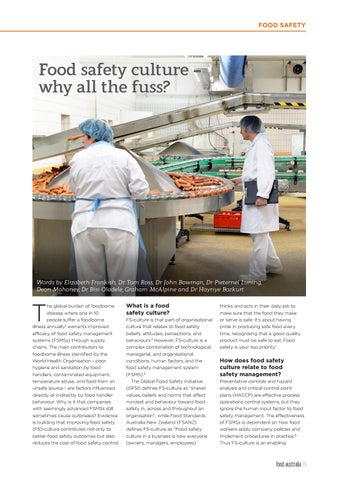FOOD SAFETY
Food safety culture – why all the fuss?
Words by Elizabeth Frankish, Dr Tom Ross, Dr John Bowman, Dr Pieternel Luning, Deon Mahoney, Dr Bisi Oladele, Graham McAlpine and Dr Hayriye Bozkurt
T
he global burden of foodborne disease where one in 10 people suffer a foodborne illness annually1 warrants improved efficacy of food safety management systems (FSMSs) through supply chains. The main contributors to foodborne illness identified by the World Health Organisation - poor hygiene and sanitation by food handlers, contaminated equipment, temperature abuse, and food from an unsafe source - are factors influenced directly or indirectly by food handler behaviour. Why is it that companies with seemingly advanced FSMSs still sometimes cause outbreaks? Evidence is building that improving food safety (FS)-culture contributes not only to better food safety outcomes but also reduces the cost of food safety control.
What is a food safety culture? FS-culture is that part of organisational culture that relates to food safety beliefs, attitudes, perceptions, and behaviours.2 However, FS-culture is a complex combination of technological, managerial, and organisational conditions, human factors, and the food safety management system (FSMS).3 The Global Food Safety Initiative (GFSI) defines FS-culture as “shared values, beliefs and norms that affect mindset and behaviour toward food safety in, across and throughout an organisation”, while Food Standards Australia New Zealand (FSANZ) defines FS-culture as “Food safety culture in a business is how everyone (owners, managers, employees)
thinks and acts in their daily job to make sure that the food they make or serve is safe. It’s about having pride in producing safe food every time, recognising that a good quality product must be safe to eat. Food safety is your top priority”.
How does food safety culture relate to food safety management? Preventative controls and hazard analysis and critical control point plans (HACCP) are effective process operations control systems, but they ignore the human input factor to food safety management. The effectiveness of FSMSs is dependent on how food workers apply company policies and implement procedures in practice.5 Thus FS-culture is an enabling
food australia 35

